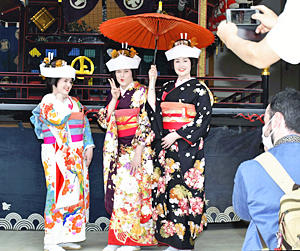ALTs realize dream of wearing bridal kimono for festival(念願の祇園祭花嫁衣装)

Three assistant language teachers (ALTs) of English from the United States and Canada created a special memory on June 12 before two of them had to return home, thanks to the special kindness of a hair salon owner.
As the traditional Gion Festival of Aizu-Tajima in the town of Minami-Aizu was canceled for a second year in a row, they were unable to realize their dream of taking part in one of the main elements of the festival: a procession of dozens of women in bridal kimono, parading glamorously through the local community.
Maya McTighe and Abbi Conley of the United States and Erika Csanyi of Canada instead had the opportunity to be dressed in Japanese bridal costume and photographed in front of a festival float.
約800年の伝統を誇る南会津町の国指定重要無形民俗文化財「会津田島祇園祭」で、数十人があでやかに町内を練り歩く花嫁行列。新型コロナウイルス感染症の影響で2年連続の中止が決まり、参列がかなわなかった会津地方の英語指導助手(ALT)の女性3人が12日、地元美容院の協力で念願の花嫁衣装に袖を通し、帰国前に特別な思い出をつくった。
"I wanted them to experience Japanese culture," said Yayoko Ogura, proprietress of a local hair salon who has also been engaged for many years in helping women dress in bridal kimono. Her wish helped the trio realize a "procession of women in bridal dress, for just the three of them."
The Gion Festival of Aizu-Tajima, with about 800 years of tradition, has been designated by the central government as an important, intangible folk cultural property. The three women were looking forward to taking part in the festival, but the coronavirus pandemic affected their plans.
Ogura proposed helping them wear a Japanese bridal costume as she learned that McTighe, who teaches at prefecture-run Tajima High School, and Conley, who teaches at prefecture-run Aizu High School, were to go back home in July. Ogura wanted to help them have special memories in their final days in Fukushima Prefecture.
「日本文化に触れさせてあげたかった」。長年、花嫁衣装の着付けなどを行ってきたビューティーショップエムのオーナー小椋やよ子さんの思いが、「3人だけの花嫁行列」の実現につながった。参加を楽しみにしていたマヤ・マクタイさん(米国出身)とアビー・コンリーさん(同)、エリカ・チャイニーさん(カナダ出身)の3人から花嫁衣装の足袋を預かっていた小椋さん。田島高で教えるマクタイさんと会津高のコンリーさんが7月に帰国すると聞き、最後の思い出にと花嫁衣装の着付けを提案したという。
It took about two hours for the trio to be transformed into Japanese bridal attire-clad women at the hair salon. Later, they had their commemorative photos taken in front of a big float, which is usually used during the annual festival, and also at Tadeuga Shrine in the town.
同店で約2時間かけて美しい花嫁姿へと変身を遂げたマクタイさんたち。祇園祭で実際に使われる上大屋台や田出宇賀神社で記念の写真撮影に臨んだ。
Conley, who came to Japan as part of post-disaster reconstruction assistance following the 2011 Great East Japan Earthquake, said Fukushima is a special place for her. She said she would like to come back to attend the festival with her family after the pandemic is contained.
( Translated by The Japan News )
東日本大震災の復興支援で来日した経験を持つコンリーさんは「祭りに参加できないのは悲しい。福島は特別な場所。新型コロナが終息したら家族を連れて必ず祭りに参加したい」と再来日を誓い、笑顔を咲かせた。
【 2021年6月16日付・福島民友新聞掲載 】
- Futaba Post Office reopens after 13 years(双葉郵便局、13年ぶりに再開)
- Craft sake brewery to make unmanned station more welcoming(無人駅の「クラフトサケ」醸造所がお出迎え)
- New Kitakata ramen developed to appeal to foreign tourists(訪日客向けの喜多方ラーメン開発)
- Aizu-Wakamatsu students come together with teahouse project(会津若松の生徒、茶室プロジェクトに集結)
- New hotel to be symbol of reconstruction(復興のシンボルとなる新ホテル)
- Radiation-resistant cameras to be produced in Fukushima(耐放射線カメラ、福島県で生産へ)
- International flights to Fukushima to resume after 13-year hiatus(福島の国際定期便、13年ぶり再開へ)
- Fukushima association to create base for parents of children with disabilities(障害児の親へ拠点作り)
- Real shell mound from Jomon period goes on display in Minami-Soma(南相馬で縄文のリアル貝塚展示)
- Japanese man opens restaurant to provide free meals to residents of war-hit Ukraine city(日本人男性が戦禍のウクライナに無料レストラン開店)